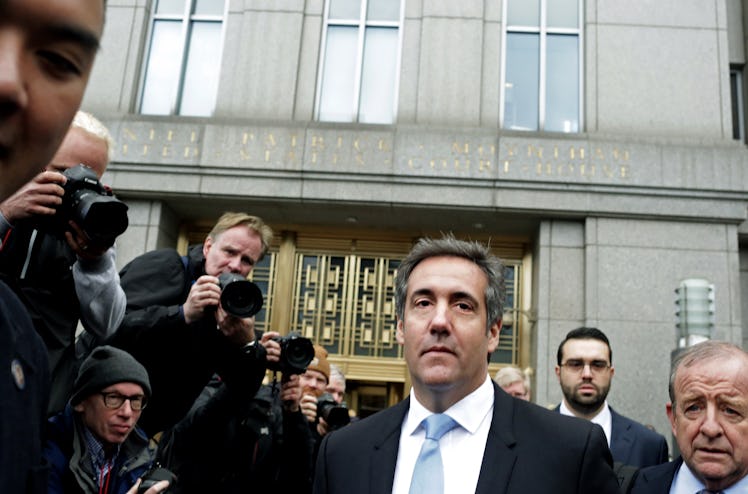
Donald Trump's Lawyer Is Claiming This Privilege As A Defense, & Here's What To Know
Since the office and residencies of President Donald Trump's longtime personal attorney were raided by the FBI on April 9, there's been a lot of discussion surrounding the rule of attorney-client privilege. Cohen claims that this prevents the prosecutors in New York from reviewing the seized documents in those raids — but does it actually? What is attorney-client privilege exactly, and can Cohen actually use this as his defense in court?
The short answer is — maybe not. As defined in the Wex legal dictionary hosted by the Legal Information Institute at the Cornell Law School, attorney-client privilege is a privilege "that works to keep communications between an attorney and his or her client secret." Basically, it's a rule that keeps conversations between lawyers and their clients confidential — without this privilege, people might not tell their lawyers the complete truth about their legal situation, which can hinder a lawyer's ability to defend clients in court.
So this rule is a real thing that lawyers exercise with their clients. But this privilege does not apply to all communications between attorneys and their clients. There is a limit — attorney-client privilege is lost if there is probable cause that the client used their lawyer to commit a crime or fraud — also known as the crime-fraud exception.
And therein lies why Cohen's attorney-client privilege argument is pretty weak.
According to NPR, on April 13 federal prosecutors in New York disclosed in court documents that Cohen has been the subject of a months-long criminal investigation prior to the FBI raids on the office and two residences of Trump's personal lawyer on Monday, April 9. Agents reportedly seized documents related to the ongoing legal battle between the president and adult film actress Stormy Daniels, among other topics of interest. The warrants for these raids were reportedly approved in part due to a referral from Special Counsel Robert Mueller (who is currently investigating whether or not Trump's 2016 presidential campaign colluded with the Russian government to sway the election result) and was personally signed off by the Trump-appointed Deputy Attorney General Rod Rosenstein. In a statement, Cohen's lawyer Stephen Ryan called the raids “completely inappropriate and unnecessary" and said that "Mr. Cohen has cooperated completely with all government entities."
Since then, both Cohen and the president's legal teams have been battling over what can be done concerning the documents seized in those raids. On April 15, Trump's lawyers submitted a letter to a federal judge asking that he be allowed to review the seized documents to before federal prosecutors do in order to protect attorney-client privilege, according to The Washington Post. And on April 16, during Cohen's first appearance in court regarding this case, his legal team called on Manhattan Federal Court Judge Kimba Wood to appoint an independent party to review the documents in order to determine which were protected under attorney-client privilege, according to the New York Daily News.
Judge Wood ultimately allowed prosecutors to move forward with the initial stages of the review in court on April 16, denying both Cohen and Trump their requests. Prosecutors say they have a "taint team" in place (also known as a "filter team") that will review the documents and determine which are privileged and which can be used in Cohen's criminal prosecution.
Of course, the president had to tweet out his two cents about the situation as well. Following the raids, Trump expressed his outrage regarding the actions made my federal prosecutors on April 10 and declared that, "Attorney–client privilege is dead!"
There is a chance that there are documents that might fall under attorney-client privilege, and those documents will not be disclosed. But the decision as to which documents are privileged or not is not up to Trump nor Cohen. So the attorney-client privilege argument is not completely invalid, but it is potentially invalid under the terms that both the Trump and Cohen legal teams are framing it.
One of Cohen's lawyers, Todd Harrison, said to Judge Wood that it was unfair to imply that their team was "going to be bad on this" — referring to their request to review the documents themselves, according to Business Insider. To which Judge Wood replied, "It's not that you're bad people, it's that you've miscited the law at times."
So, no, Mr. President. Attorney-client privilege is anything but dead.
We still don't know where this case will go, but with the document review process underway the public will surely find out in due time.